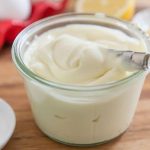 A food product made basically of an oil-in- water emulsion with egg yolk, vinegar, salt, and flavoring and coloring ingredients.
A food product made basically of an oil-in- water emulsion with egg yolk, vinegar, salt, and flavoring and coloring ingredients.
Although mayonnaise is fairly easy to make—simply blend egg yolks, oil, vinegar, and seasonings—etymologists have had great difficulty ascertaining the origin of its name. Some have suggested the name originated as a corruption of Bayonnaise, a sauce named after the town of Bayonne in France; others have suggested it derives from the Old French word for egg yolk, moyeu; and still others have proposed that it arose from the French verb manier, meaning to stir. More likely than any of these three, however, is that the sauce was named after Mahon, a port on the island of Minorca that the Duke of Richelieu captured in 1756. To commemorate the Duke’s victory, but no doubt also to benefit from association with it, French chefs named their new sauce mahonnaise; later on, having forgotten about the Duke’s immortal triumph, the French respelt the word as mayonnaise, the form English adopted in the mid nineteenth century. The port of Mahon, incidentally, takes its name from Magon, a Carthaginian general who helped his brother Hannibal wage war against the Roman Empire.
A mixture of egg yolks, vinegar, oil, lemon juice, and a blend of seasonings, thoroughly combined and enhanced with a small amount of boiling water to promote cohesion. Initially, this mixture possesses a somewhat runny consistency, but later thickens or congeals over time.
